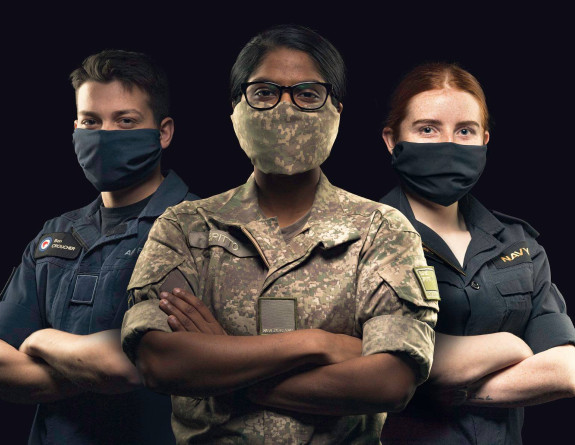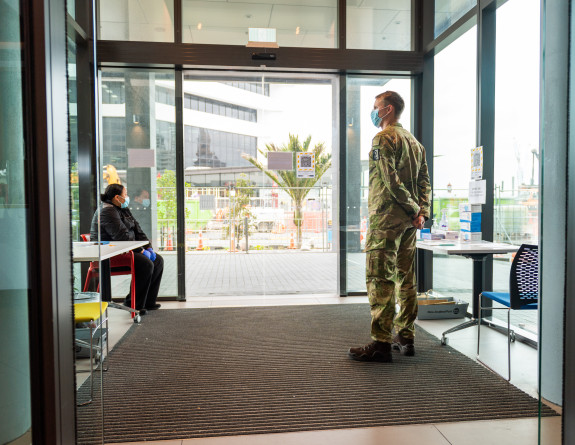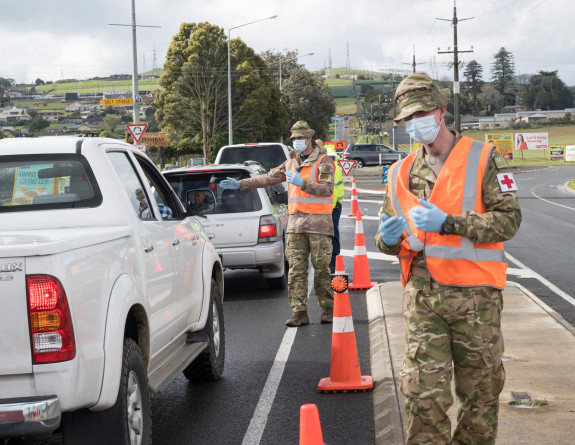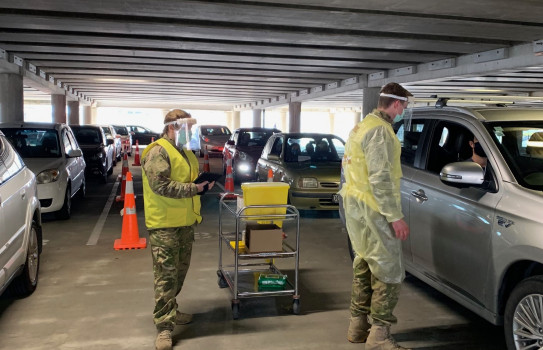West Coast to the Middle East: A soldier’s experience
28 June 2025
Unfortunately you are viewing this website on an outdated browser which does not support the necessary features for us to provide an adequate experience. Please switch to a modern browser such as latest version of Google Chrome, Mozilla Firefox, Apple Safari or Microsoft Edge.
Ngā mihi nui
COVID-19
On 19 March 2020, New Zealand closed its borders. On 9 April, the Prime Minister announced that a network of Managed Isolation and Quarantine Facilities (MIQFs) would be established, to bring citizens and residents home. The Army, Navy and Air Force have been tasked with supporting the MIQFs, as part of a multi-agency effort run by the Ministry of Business, Innovation and Employment.
Even before the creation of the MIQFs, around 120 NZDF planning and logistics staff were attached to the Government’s COVID-19 response teams. At our training facility on Whangaparaoa Peninsula, we used 64 campervans to create New Zealand’s first quarantine facility in modern times, and we welcomed 157 returnees, ranging from children to the elderly, from Wuhan, China.
This soon evolves to the concept of hotels being used as isolation centres where returnees are isolated for two weeks.
Operation Protect became the name of the NZDF contribution, and it touches at the heart of what we train to do.
Our Army personnel are on the front line, helping to protect our country and the well-being of our population, and we are doing it in a professional and caring way that is noticed and has a powerful effect on the thousands of people returning to New Zealand.



By October 2020, more than 1,000 of our personnel are rotating through the MIQFs, taking their turn and typically work seven days on, six days off.
“When we took a bus ride to a managed exercise area, they kept their distance, but one of the soldiers provided some entertainment for my daughter for half an hour, telling her riddles. Another time, someone did a lot of chalk mind-teasers on the carpark tarmac below our window. It’s that kindness and thoughtfulness that makes people’s stay that little bit better,” said returnee Mike LaFranchie, Taranaki.
Elsewhere, the Army supports the New Zealand Police with checkpoint duties around Auckland when alert levels change.
“As the COVID-19 response has progressed and evolved, the New Zealand Defence Force has played a critical role across a variety of fronts to protect New Zealand’s borders. The NZDF personnel’s abilities to deploy quickly, remain focused while away from their homes and whānau, and quickly establish procedures, instructions and routines have been a vital tool in the All-of-Government response to COVID-19.”
- John Ombler, Deputy Chief Executive of the Department of Prime Minister and Cabinet’s COVID-19 Response Group
As of July 2021, more than 150,000 returnees have been through a MIQF in New Zealand - with the Army contribution being central, and made whilst also maintaining many other outputs.

New Zealand Army medics vaccinating Wellingtonians
As well as providing support to the MIQFs, ten of our medical personnel put their training into action at the Sky Stadium drive-through vaccination centre as part of Op Protect. With an aim to vaccinate 1,000 Wellington residents per day, our personnel and staff came together with Capital and Coast District Health Board, Tū Ora Primary Health Organisation, Whitireia Polytech nursing students and Wellington Free Ambulance to help vaccinate Wellingtonians.
Responding to COVID-19 is the New Zealand government’s highest priority and we take pride in being able to use our skills as a highly-trained, adaptable Army to fulfil our commitments.
The Government announced in March 2022 that with the re-opening of New Zealand’s border, the decision was made to reduce the 32 MIQ facilities to four by the end of June 2022. The reduction in facilities meant the MIQ workforce in them would change too, with our NZDF personnel beginning to return to their usual duties.
By 31 March 2022, around 90% of NZDF personnel had returned to their respective camps and bases around the country. A small number of NZDF personnel remained in MIQ national office and regional operations to assist with the transition of roles to the Ministry of Business, Innovation, and Employment (MBIE).
MBIE Deputy Secretary and Head of MIQ, Chris Bunny, said the contribution of the NZDF had been instrumental over the past 2 years.
“The skill, professionalism and mahi of the NZDF contribution has been a defining factor in shaping the success of MIQ."
- MBIE Deputy Secretary and Head of MIQ, Chris Bunny
“Along the way bonds have been formed, different perspectives shared and a common approach achieved. The involvement of the NZDF has been an intrinsic part of the fabric of MIQ.”
Friday 13 May 2022 marked the official withdrawal of NZDF personnel from MIQ duties as part of Operation Protect. A ceremony was held at Devonport Naval Base which officially concluded our service on Operation Protect and allowed NZDF leaders and personnel to recognise the significant contribution our people made to keep New Zealanders safe during the pandemic.
“We acknowledge the work of a very large number of NZDF staff, who, for over two years have come together to protect New Zealand, and New Zealanders from a global threat not seen since 1918, when NZ last faced a pandemic of this scale” said Group Captain Glenn Gowthorpe, Commander Joint Task Force.
Operation Protect has been one of the single largest commitments of NZDF personnel made to a response in more than 50 years. Around 6,200 of our people were involved, with some on regular rotations throughout the duration of the operation.
Group Captain Glenn Gowthorpe, Commander Joint Task Force thanked all those who spent time deployed on the Operation.
“I want to thank all of you, the various groups who came together to form the platform for the NZDF to provide the planning, organisation, execution skills and processes that kept New Zealand safe for such a long period. Thank you for your efforts, sacrifices and professionalism.”
- Group Captain Glenn Gowthorpe, Commander Joint Task Force
The commitment to Operation Protect created challenges and opportunities for both the NZDF as an organisation and for our people as individuals.
From leadership development, to working with other agencies, managing risk, developing and delivering in a more empathetic way, and utilising soft skills. The presence, leadership, and mahi of our NZDF people did not go un-noticed and has significantly enhanced the awareness and reputation of the NZDF.
We must too acknowledge the challenges this Operation has presented us, including impacts of career disruptions, BAU training and capability development, and personal or family sacrifices.
As our personnel return to their usual duties at our camps and bases, we have begun regrouping, refreshing our training, and regenerating the capabilities that have been impacted by this enormous commitment.
In the Army you'll never rest on past successes. We'll push you to constantly better yourself. But you won't have to do it alone. You'll be part of a tight-knit team – people that you'll come to trust, no matter what. Whatever your role, you'll be given the best possible training, equipment and encouragement. Everything you need, in fact, to create a successful and valued career.
Find out more